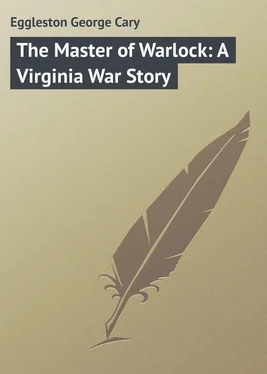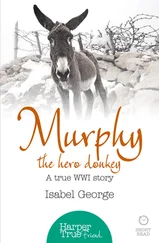George Eggleston - The Master of Warlock - A Virginia War Story
Здесь есть возможность читать онлайн «George Eggleston - The Master of Warlock - A Virginia War Story» — ознакомительный отрывок электронной книги совершенно бесплатно, а после прочтения отрывка купить полную версию. В некоторых случаях можно слушать аудио, скачать через торрент в формате fb2 и присутствует краткое содержание. Жанр: foreign_prose, на английском языке. Описание произведения, (предисловие) а так же отзывы посетителей доступны на портале библиотеки ЛибКат.
- Название:The Master of Warlock: A Virginia War Story
- Автор:
- Жанр:
- Год:неизвестен
- ISBN:нет данных
- Рейтинг книги:3 / 5. Голосов: 1
-
Избранное:Добавить в избранное
- Отзывы:
-
Ваша оценка:
- 60
- 1
- 2
- 3
- 4
- 5
The Master of Warlock: A Virginia War Story: краткое содержание, описание и аннотация
Предлагаем к чтению аннотацию, описание, краткое содержание или предисловие (зависит от того, что написал сам автор книги «The Master of Warlock: A Virginia War Story»). Если вы не нашли необходимую информацию о книге — напишите в комментариях, мы постараемся отыскать её.
The Master of Warlock: A Virginia War Story — читать онлайн ознакомительный отрывок
Ниже представлен текст книги, разбитый по страницам. Система сохранения места последней прочитанной страницы, позволяет с удобством читать онлайн бесплатно книгу «The Master of Warlock: A Virginia War Story», без необходимости каждый раз заново искать на чём Вы остановились. Поставьте закладку, и сможете в любой момент перейти на страницу, на которой закончили чтение.
Интервал:
Закладка:
Baillie Pegram had all the pride of his lineage and his class. He had sought to forget all about Agatha Ronald after her astonishing little note had come to him some months before in Richmond, and until this morning he had believed that he had accomplished that forgetfulness. But now the thought of her haunted him ceaselessly. All the way to Richmond her beauty and her charm, as she had stood there by the roadside, filled his mind with visions that tortured him. He tried with all his might to dismiss the visions and to think of something else. He bought the daily papers and tried to interest himself in their excited utterances, but failed. Red-hot leaders, that were meant to stir all Virginian souls to wrathful resolution, made no impression on his mind. He read them, and knew not what he had read. He was thinking of the girl by the roadside, and his soul was fascinated with the memory of her looks, her words, her finely modulated voice, her ways, as she had tried to refuse his offer of assistance. Had he been of vain and conceited temper, he might have flattered himself with the thought that her very hauteur in converse with him implied something more and better than indifference on her part toward him. But that thought did not enter his mind. He thought instead:
"What a sublimated idiot I am! That girl is nothing to me – worse than nothing. Circumstances place her wholly outside my acquaintance, except in the most formal fashion. She is a young gentlewoman of my own class – distinctly superior to all the other young gentlewomen of that class whom I have ever met, – and ordinarily it would be the most natural thing in the world for me to pay my addresses to her. But in this case that is completely out of the question. To me at least she is the unattainable. I must school myself to think of her no more, and that ought to be easy enough, as I am not in love with her and am not permitted even to think of being so. It's simply a craze that has taken possession of me for a time, – the instinct of the huntsman, to whom quarry is desirable in the precise ratio of its elusiveness. There, I've thought the whole thing out to an end, and now I must give my mind to something more important."
Yet even in the midst of the excitement that prevailed in Richmond that day, Baillie Pegram did not quite succeed in driving out of his mind the memory of the little tableau by the bridge, or forgetting how supremely fascinating Agatha Ronald had seemed, as she had haughtily declined his offer of service, and still more as she had reluctantly accepted it, and ridden away after so cleverly evading his offer to help her mount.
It had been his purpose to remain in Richmond for a week or more, but on the third morning he found himself homeward bound, and filled with vain imaginings. Just why he had started homeward before the intended time, it would have puzzled him to say; but several times he caught himself wondering if there would be awaiting him at Warlock an answer to his formal note of apology for not having made a call which nobody had expected him to make. He perfectly knew that no such answer was to be expected, and especially that if there should be any answer at all, it must be one of formal and repellent courtesy, containing no message from Agatha of the kind that his troubled imagination persisted in conceiving in spite of the scorn with which he rejected the absurd conjecture.
Nevertheless as he neared home he found himself half-expecting to find there an answer to his note, and he found it. It gave him no pleasure in the reading, and in his present state of mind he could not find even a source of amusement in the stilted formality of its rhetoric. It had been written by one of Agatha's aunts, and signed by both of them. Thus it ran:
"The Misses Ronald of The Oaks feel themselves deeply indebted to Mr. Baillie Pegram for his courtesy to their niece and guest, Miss Agatha Ronald, on the occasion of her recent misadventure. They have also to thank Mr. Pegram most sincerely for having taken upon himself the disagreeable duty of giving painless death to the unfortunate animal that their niece was riding upon that occasion. They have to inform Mr. Pegram that as Miss Agatha Ronald is making her preparations for an almost immediate return to her maternal grandfather's plantation of Willoughby, in Fauquier, and as she will probably begin her journey before Mr. Pegram's return from Richmond, there will scarcely be opportunity for his intended call to inquire concerning her welfare after her homeward ride upon the mare which he so graciously placed at her disposal at a time of sore need. They beg to report that the beautiful animal behaved with the utmost gentleness during the journey.
"The Oaks ladies beg to assure Mr. Pegram of their high esteem, and to express their hope that he will permit none of the events of this troubled time to prevent him from dining with them at The Oaks on the third Friday of each month, as it has been his courteous custom to do in the past. The Misses Ronald remain,
"Most respectfully, "SARAH RONALD, "JANE RONALD."This missive was more than a little bewildering. Its courtesy was extreme. Even in practically telling Baillie Pegram not to call upon their niece, the good ladies had adroitly managed to make their message seem rather one of regret than of prohibition. Certainly there was not a word in the missive at which offence could be taken, and not an expression lacking, the lack of which could imply negligence. The young man read it over several times before he could make out its exact significance, and even then he was not quite sure that he fully understood.
"It reads like a 'joint note' from the Powers to the Grand Turk," he said to the young man – his bosom friend – whom he had found awaiting him at Warlock on his return. This young man, Marshall Pollard, had been Baillie Pegram's intimate at the university, and now that university days were done, it was his habit to come and go at will at Warlock, the plantation of which Baillie was owner and sole white occupant with the exception of a maiden aunt who presided over his household.
The intimacy between these two young men was always a matter of wonder to their friends. They had few tastes in common, except that both had a passionate love for books. Baillie Pegram was fond of fishing and shooting and riding to hounds. He loved a horse from foretop to fetlock. His friend cared nothing for sport of any kind, and very often he walked over long distances rather than "jolt on horseback," as he explained. He was thoroughly manly, but of dreamy, introspective moods and quiet tastes. But these two agreed in their love of books, and especially of such rare old books as abounded in the Warlock library, the accumulation of generations of cultivated and intellectual men and women. They agreed, too, in their fondness for each other.
Marshall Pollard was never regarded as a guest at Warlock, or treated as such. He came and went at will, giving no account of either his comings or his goings. He did precisely as he pleased, and so did his host, neither ever thinking it necessary to offer an apology for leaving the other alone for a day or for a week, as the case might be. Pollard had his own quarters in the rambling old house, with perfect liberty for their best furnishing. Often the two friends became interested together in a single subject of literary or historical study, and would pore over piles of books in the great hallway if it rained, and out under the spreading trees on the lawn if the weather were fair. Often, on the other hand, their moods would take different courses, and for days together they would scarcely see each other except at meal-times. Theirs was a friendship that trusted itself implicitly.
"It's an ideal friendship, this of yours and mine," said Marshall, in his dreamy way, one day. "It never interferes with the perfect liberty of either. What a pity it is that it must come to an end!"
Читать дальшеИнтервал:
Закладка:
Похожие книги на «The Master of Warlock: A Virginia War Story»
Представляем Вашему вниманию похожие книги на «The Master of Warlock: A Virginia War Story» списком для выбора. Мы отобрали схожую по названию и смыслу литературу в надежде предоставить читателям больше вариантов отыскать новые, интересные, ещё непрочитанные произведения.
Обсуждение, отзывы о книге «The Master of Warlock: A Virginia War Story» и просто собственные мнения читателей. Оставьте ваши комментарии, напишите, что Вы думаете о произведении, его смысле или главных героях. Укажите что конкретно понравилось, а что нет, и почему Вы так считаете.












